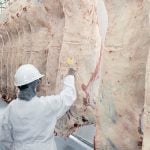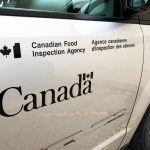
Features

Post-calving nutrition determines next year’s success
Management: Your cow's nutritional regime will have a major influence on when and if it gets bred.
In some areas of Canada this has been a very difficult winter to be a cow-calf producer. With last summer’s drought and the current feed shortage in those areas, many producers are left pondering what to do. Barry Yaremcio, a nutrition specialist with Alberta Agriculture and Forestry, and Murray Feist a beef cattle nutritionist with […] Read more

Transitioning bulls from feeding to breeding
Prepare to have a good transition program after you bring a bull home
The hardest time for a young bull is when he’s turned out with cows for his first breeding season, after being well fed all winter. Most bulls are raised in unnatural conditions. After weaning they are confined and often fed high-concentrate feeds, and pushed for fast growth. Many go through a bull test/feeding program to […] Read more

Getting a global perspective on our beef industry
Young Manitoba cattle producer brings international experiences back to the farm
When Manitoba cattle producer Wilco van Meijl stepped off the plane in Paraguay to attend the International Beef Alliance (IBA) conference in October, he did so with an open mind, a desire to meet new people and to learn more about global beef production. He certainly achieved his goals and a lot more. “What was […] Read more
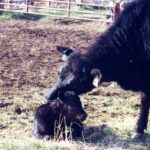
Treat individual cows to raise the reproductive rate
Ensure good uterine health to help prepare cows for re-breeding
As herds get bigger and electronic ID tags get used more for record-keeping, more attention can be given to individual cow medicine. We can learn lots from our colleagues in dairy production about looking after individual cows. Health and fertility go hand in hand. If by paying attention and potentially treating cows with everything from […] Read more

Lapses in biosecurity create long-standing risks
Reducing risk of transmission of salmonella and other diseases
Salmonella bacteria have been isolated from nearly all vertebrates, and infections have been associated with both animal and human disease. Not uncommonly, foods of animal origin have been implicated as the source of human illness caused by salmonella. Typical signs of salmonella infection in cattle and humans include fever and diarrhea. Severe cases can result […] Read more

Cold and abomasal impaction
Vet Advice with Dr. Ron Clarke
Beef cattle on the Canadian Prairies are subject to considerable environmental stress during winter. Starting with the early days of ranching and arrival of U.S. cattle onto the eastern slopes of the Rockies through the mid-1800s, survival of the beef cow meant adaptation to prolonged cold temperatures. Cold and the groundless belief that cattle could […] Read more
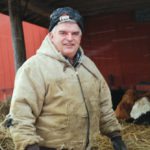
Improving livestock traceability key to higher profits
More feedback needed to build better herds
Dave Milliner thinks the upcoming changes to federal regulations on livestock traceability are good but don’t go far enough. He contends that much more could be done in the beef industry to improve the quality of the meat, the productivity of the animals, returns for farmers and choices for consumers. “There’s no feedback loop — […] Read more
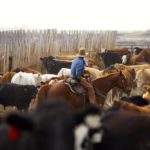
The off-farm job
Grazing with Steve Kenyon
When I came out of high school, many years ago, I was under the impression that if I wanted to farm, I would need to have an off-farm job. I am not sure how that message was instilled in me as my father did not have one when he farmed. I guess I was told enough […] Read more

Well-timed updates on bull scrotal circumference
The third edition of the Bull Breeding Soundness outlines a few changes
The Western Canadian Association of Bovine Practitioners (WCABP) has published a third edition of the Bull Breeding Soundness manual written by Dr. Albert D. Barth, which contains some changes to the accepted minimal scrotal circumference for the different breeds at different ages. The old standard was a few years old so this new version is […] Read more
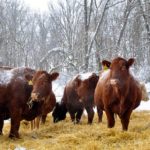
Fuelling up cows for cold weather and calving
Health: A cow's body condition is closely linked to calving success
It takes a North American prairie cold snap, those first two to three weeks of real winter when outside temperatures plummet where Fahrenheit and Centigrade meet below zero, for beef specialists to dust off and publish articles on managing cows through cold — the -40 C kind. They all make valid points; gentle reminders for […] Read more

